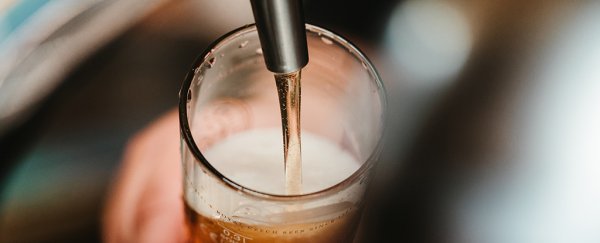An empty bank account and a fuzzy head are two of the reasons that many of us decide to have a month off the drink in January, but what exactly are the benefits of a booze-free start to the New Year?
Well, researchers have the answer.
Based on a survey of 816 people who took part in Dry January 2018, it seems staying off the sauce til February leaves you in greater control of your drinking habits, gives you more energy, can help you lose weight, and even improves your skin texture.
Not a bad list of positives then, and the team from the University of Sussex is encouraging more people to give the Dry January exercise a try this time around – and even if you don't manage to stay alcohol-free for the whole month, you can still feel the advantages.
"The simple act of taking a month off alcohol helps people drink less in the long term: by August people are reporting one extra dry day per week," says one of the researchers, psychologist Richard de Visser. "There are also considerable immediate benefits: nine in ten people save money, seven in ten sleep better and three in five lose weight."
"Interestingly, these changes in alcohol consumption have also been seen in the participants who didn't manage to stay alcohol-free for the whole month – although they are a bit smaller. This shows that there are real benefits to just trying to complete Dry January."
Let's hit you with the stats: when the study participants reported back in August, average drinking days per week had fallen to 3.3 from 4.3, average units consumed per drinking day had fallen to 7.1 from 8.6, and the average number of times people were drunk per month had dropped from 2.1 to 3.4.
Whether you're looking at those figures thinking they're a model of excess or a model of sobriety, we can all feel the benefits from a dry month – it doesn't have to be January.
"The brilliant thing about Dry January is that it's not really about January," says Richard Piper, CEO of Alcohol Change UK, which carried out related research showing 1 in 10 people in the UK were planning a dry January.
"Being alcohol-free for 31 days shows us that we don't need alcohol to have fun, to relax, to socialise. That means that for the rest of the year we are better able to make decisions about our drinking, and to avoid slipping into drinking more than we really want to."
If you still need convincing, the study of Dry January participants found 67 percent of people had more energy, 58 percent lost weight, and 54 percent had better skin. What's more, 4 out of 5 people felt they had more control over their drinking.
The survey showed 71 percent of people felt they were sleeping better, 88 percent saved money, and 93 percent reported a sense of achievement.
One of the aims of the research was to show the more immediate benefits that a booze break can have on health and well-being, but there are a whole host of extra long-term health risks associated with too much alcohol.
Moderate or excessive drinking has been linked to an early death, mental health issues, increased cancer risk, brain damage, and of course failing livers.
"Put simply, Dry January can change lives," says Piper. "We hear every day from people who took charge of their drinking using Dry January, and who feel healthier and happier as a result."
